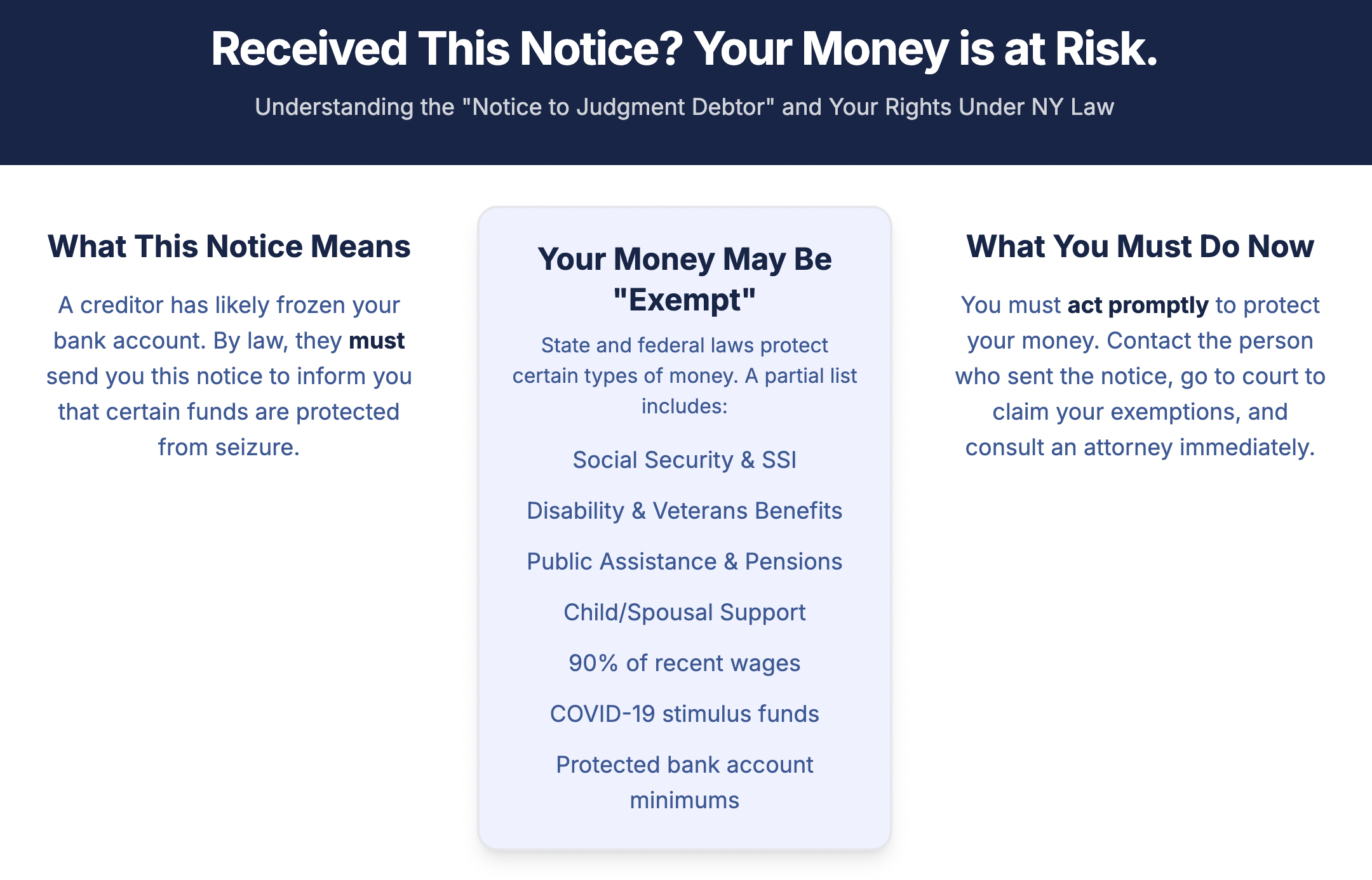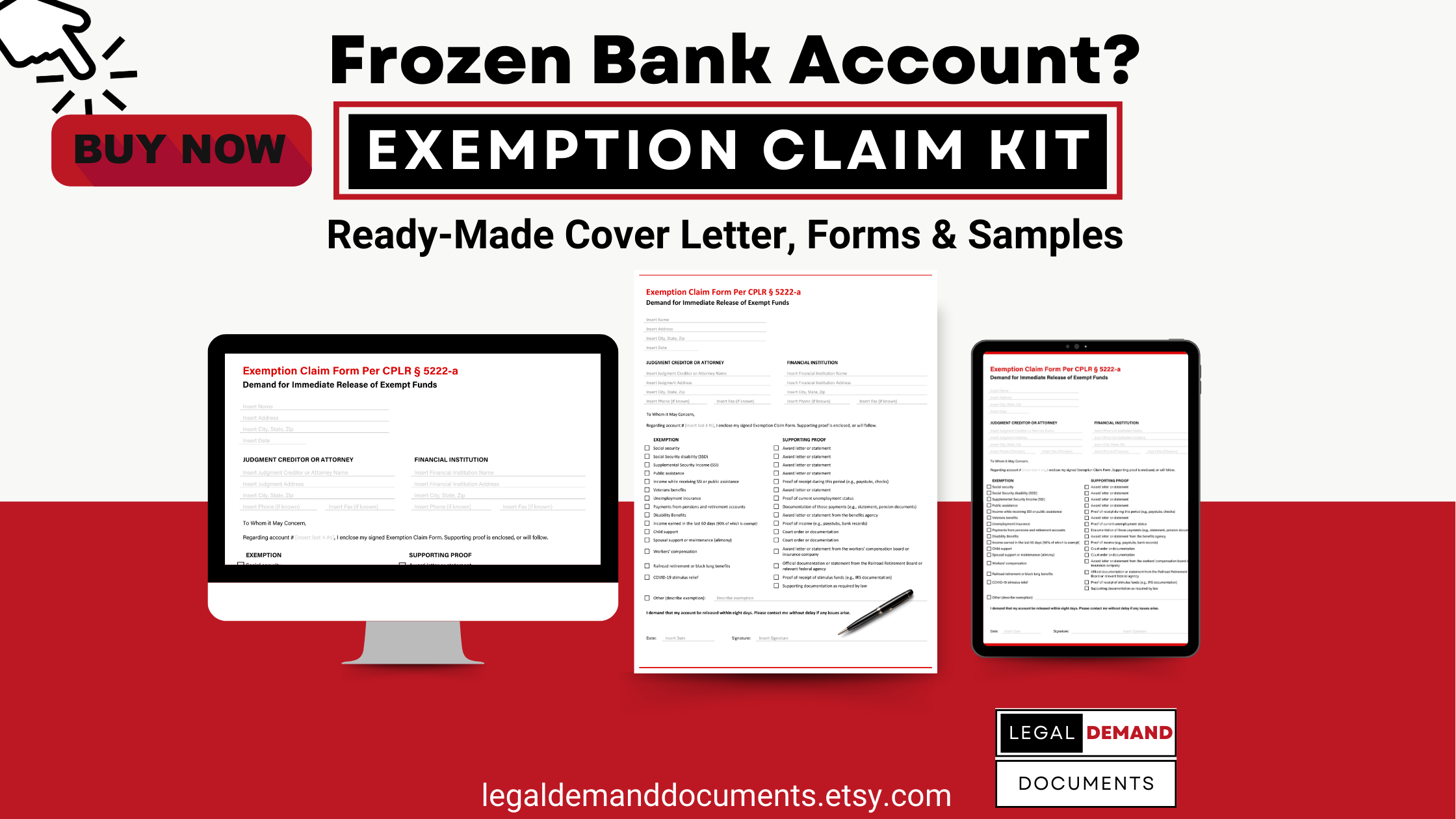If you've received a letter with language similar or identical to the one below, you are being put on notice that your money is at risk of being seized by a judgment creditor. Under CPLR § 5222(d), if a creditor has not sent you the required exemption notice within the past year, the creditor must mail or deliver that notice to you no later than four days after serving the restraining notice on your bank. If you have not received the required notice within the previous year, the creditor must send it to you within four days after the restraining notice is served on the bank. A restraining notice may be issued by the clerk, the creditor’s attorney, or a support collection unit, and it operates to freeze accessible funds.
Because the following sources of income are exempt, creditors must provide the required statutory notice and forms, and banks must automatically apply certain account protections under EIPA.
A creditor’s failure to comply may warrant vacating the restraint or denying turnover until the statute is followed.[1] You should act promptly if you have received one of these notices. If you need guidance, my office can help you evaluate your options.
NOTICE TO JUDGMENT DEBTOR OR OBLIGOR
Money or property belonging to you may have been taken or held to satisfy a judgment or order that has been entered against you. Read this carefully.
YOU MAY BE ABLE TO GET YOUR MONEY BACK
State and federal laws prevent certain money or property from being taken to satisfy judgments or orders. Such money or property is said to be “exempt.” The following is a partial list of money that is legally exempt from judgment enforcement:
- Supplemental Security Income (SSI);
- Social Security;
- Public assistance (welfare);
- Spousal support, maintenance (alimony), or child support;
- Unemployment benefits;
- Disability benefits
- Workers’ compensation benefits;
- Public or private pensions;
- Veterans benefits;
- A protected amount of $3,425 is automatically shielded in any account that has received qualifying exempt direct deposits within the last 45 days (amount adjusts every 3 years);
- Ninety percent of wages earned within the last 60 days is exempt from restraint. If those wages are deposited into a bank account, additional minimum-wage-based floor protections may apply under CPLR 5222(i);
- Railroad retirement; and
- Black lung benefits.
If you think that any of your money that has been taken or held is exempt, you must act promptly because the money may be applied to the judgment or order. If you claim that any of your money that has been taken or held is exempt, you may contact the person sending this notice.
Also, YOU MAY CONSULT AN ATTORNEY, INCLUDING ANY FREE LEGAL SERVICES ORGANIZATION IF YOU QUALIFY. You can also go to court without an attorney to get your money back. Bring this notice with you when you appear in court. You may bring a claim under CPLR 5222-a (for bank restraints), or commence proceedings under CPLR 5239 or 5240 to determine rights in the property and to seek modification or vacatur of enforcement procedures. If you do not have a lawyer, the clerk of the court may give you forms to help you prove your account contains exempt money that the creditor cannot collect. The law (CPLR 5239 and 5240) provides a procedure for the determination of a claim for an exemption.

Mandatory Notice Requirements for Judgment Debtors
When serving a restraining notice, if no requisite notice has been given to the judgment debtor within the last year, a copy of both the restraining notice and the notice to the debtor must be delivered within four days of the restraining notice's service. (CPLR 5222(d))
The notice must be mailed to the debtor’s residence in an envelope marked ‘personal and confidential’ without any reference to attorneys or judgment enforcement. If that address is unknown or mail is returned, it must be sent to the debtor’s place of employment or another known address using the same envelope restrictions
If the notice is undeliverable or if the residence address is unknown, it should be sent to the debtor's place of employment or any other known address. (CPLR 5222(d))
The notice's primary purpose is to inform debtors about potential exemptions and to encourage them to seek legal advice. The notice informs natural-person debtors of their statutory exemptions and of the CPLR 5222-a claim-of-exemption process, which applies specifically to bank restraints and includes strict timelines. Contact Resource Services, LLC v. Gregory, 10 Misc. 3d 968, 806 N.Y.S.2d 407 (N.Y. City Ct. 2005); Friedman v. Mayerhoff, 156 Misc. 2d 295, 592 N.Y.S.2d 909 (N.Y. City Civ. Ct. 1992))
Non-compliance can result in vacating a restraint or denial of turnover until statutory notice is given. (Chemical Bank v. Flaherty, 121 Misc. 2d 509, 468 N.Y.S.2d 315 (N.Y. City Civ. Ct. 1983))
Attorneys who fail to comply may be held personally liable. (Banks v. Leef, 120 Misc. 2d 1083, 467 N.Y.S.2d 156 (Sup 1983), order aff'd, 101 A.D.2d 1034, 475 N.Y.S.2d 307 (2d Dep't 1984))
Effective May 13, 2021, Article 52 temporarily required COVID-19 stimulus payments to be treated as exempt and incorporated that language into statutory notices and forms. Although the emergency programs have ended, the amendment remains part of the statutory history. (CPLR 5222(e), amended effective May 13, 2021)
NY CPLR § 5222 Case Summaries
**Note: Some of the cases below pre-date New York’s 2009 Exempt Income Protection Act (EIPA), which added important debtor-protection procedures. Their holdings remain relevant but must be read in the context of current EIPA requirements.
1. Validity of Restraining Notices on Judgment Debtors
Restraining notices for judgment debtors were deemed valid concerning a creditor's pursuit of an execution and turnover order, as the closely-held corporation as a debtor was not subject to notice requirements under NY law. Sole officers and shareholders were well-informed of the notice and its constraints, not infringing on due process. EIPA’s debtor-notice/exemption protections apply to natural persons; corporate debtors are not entitled to those EIPA notices.
Cordius Trust v. Kummerfeld Associates, Inc., 2009, 658 F.Supp.2d 512.
2. Notice Burden on Judgment Debtor
The required notice given to every judgment debtor with restrained property under New York law places the obligation on the debtor to counter the levy. Post-EIPA, banks must apply statutory shields and creditors must serve exemption notices/forms; debtors still must act promptly to assert exemptions using the CPLR 5222-a procedure.
Jonas v. Citibank, N.A., 2006, 414 F.Supp.2d 411.
3. Jurisdiction Over International Bank's NY Branch
The "separate entity rule" didn't prevent the court from having jurisdiction over the NY branch of an international bank, urging it to produce information about its foreign branches. International comity principles didn't hinder subpoena enforcement.
B & M Kingstone, LLC v. Mega Intern. Commercial Bank Co., Ltd. (1 Dept. 2015) 131 A.D.3d 259, 15 N.Y.S.3d 318.
4. Invalid Execution Due to Notice Oversight
An execution was deemed invalid as the creditor didn't provide execution notice to the judgment debtor and the execution had incorrect details.
Kitson & Kitson v. City of Yonkers (2 Dept. 2007) 40 A.D.3d 758, 835 N.Y.S.2d 670.
5. Bank's Obligation in Restraining Notice
A bank wasn't required to freeze an account not explicitly mentioned in an appropriate restraining notice.
Tri-Global Management Corp. v. Citibank, N.A. (2 Dept. 2007) 39 A.D.3d 627, 833 N.Y.S.2d 233.
6. Procedural Due Process Requirement
Constitutional procedural due process necessitates notice of exempt property to be provided to the judgment debtor along with procedures to lengthen a previously obtained levy.
Commissioner of Labor v. Chudzik, 1984, 126 Misc.2d 968, 484 N.Y.S.2d 753.
7. Compliance with Notice Requirements
A turnover procedure against a garnishee cannot proceed if the judgment creditor hasn't adhered to this section about notice to the judgment debtor regarding the restraining notice.
Chemical Bank v. Flaherty, 1983, 121 Misc.2d 509, 468 N.Y.S.2d 315.
8. Dismissal for Failing to Serve Correct Notice
A creditor's restraining notice to a bank was dismissed without prejudice due to the failure to serve the judgment debtor with the appropriate notice concerning property exemptions.
Weinstein v. Gitters, 1983, 119 Misc.2d 122, 462 N.Y.S.2d 553.
9. Executor's Role and Estate Assets
An executor, in their representative role, doesn't have a restrainable interest in estate assets. Thus, a restraining notice served to them was unauthorized interference and was annulled.
In re Stein's Estate, 1969, 60 Misc.2d 544, 303 N.Y.S.2d 31.
[1] Friedman v. Mayerhoff, 156 Misc. 2d 295 (NY Civ Ct 1992)(holding that where the judgment debtors were not served with the required notice of their rights regarding a restraining notice and execution on several bank accounts, the restraining notice and execution should be vacated despite the fact that the bank advised the judgment debtors of the action in enough time for the debtors to commence legal action to protect their rights and thus suffered no actual prejudice).



